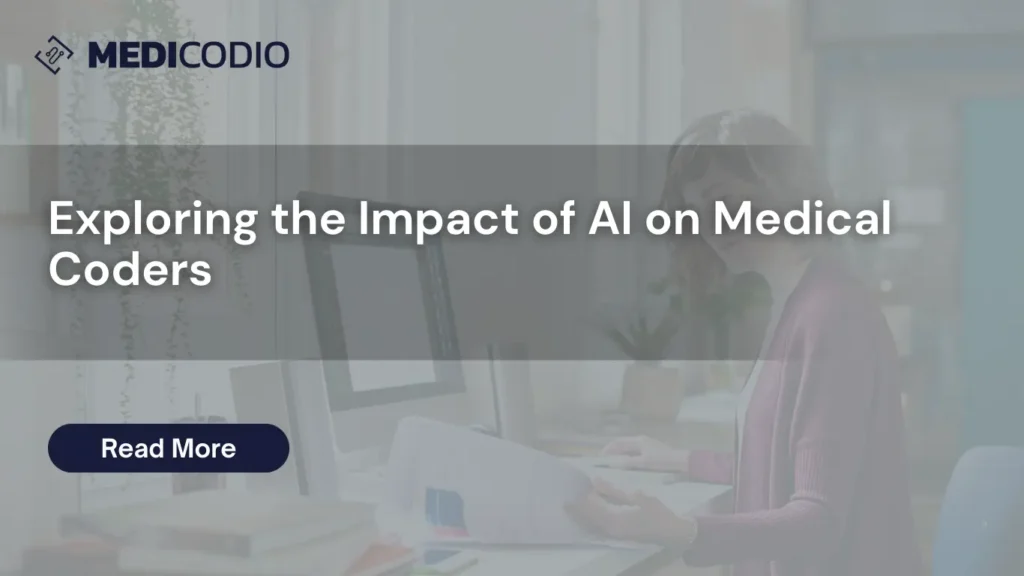Artificial Intelligence (AI) is transforming various industries, and healthcare is no exception. One area witnessing significant transformation is medical coding, where AI revolutionizes how medical coders work. AI is beneficial to both medical coders as well as healthcare facilities. This blog highlights the profound impact of AI on medical coders, shedding light on the benefits and how it can transform the healthcare RCM process.
The Role of Medical Coders
Medical coders play a crucial role in the healthcare system. They are responsible for translating healthcare diagnoses, procedures, and medical services into universal medical alphanumeric codes. These codes are essential for billing and insurance purposes, ensuring healthcare providers are reimbursed accurately for their services. Traditionally, this process has been manual, time-consuming, and prone to human error.
AI-Powered Medical Coding: A Game Changer
How does AI work in medical coding? AI-powered medical coding tools are designed to automate and streamline the coding process. Here’s how AI is making a significant impact:
- Enhanced Accuracy and Compliance
AI algorithms are trained to understand complex medical terminology and coding standards. Tools like CODIO use Natural Language Processing (NLP) to analyze clinical notes and suggest accurate codes. They also perform NCCI Edit checks to ensure compliance with coding guidelines. This reduces the likelihood of errors and ensures that claims are processed correctly, improving revenue integrity.
- Increased Productivity
AI systems can process vast amounts of data much faster than human coders. They can read data from various Electronic Health Records (EHR) and predict medical codes for all specialties. This automation allows coders to focus on more complex cases that require human judgment, increasing overall productivity.
3. Less strain more work
The AI medical coding tool reduces the strain on medical coders by automating repetitive and time-consuming tasks while minimizing errors. They don’t have to switch between multiple windows for more information. This allows coders to focus on more complex cases, enhancing productivity and accuracy, ultimately leading to more efficient workflows and improved job satisfaction.
- Cost Efficiency
By automating routine coding tasks, healthcare organizations can reduce labor costs. AI-powered tools can handle heavy coding workloads, coding millions of charts per day effortlessly. This scalability feature is particularly beneficial for large healthcare providers and Revenue Cycle Management (RCM) companies.
- Improved Revenue Cycle Management
Accurate coding is crucial for timely and accurate billing. AI tools generate Claim Charge Capture reports, ensuring that all billable services are accounted for. This leads to improved cash flow and financial stability for healthcare providers.
The Changing Role of Medical Coders
While AI is enhancing the efficiency and accuracy of medical coding, it is also reshaping the role of medical coders. Instead of being seen as a threat, AI should be viewed as a powerful assistant that complements the skills of human coders. Here’s how:
- Focus on Complex Cases
AI can handle routine and straightforward coding tasks, freeing up medical coders to concentrate on more complex and nuanced cases. Their expertise is still crucial for interpreting ambiguous clinical notes and ensuring accurate coding.
- Quality Assurance and Auditing
Medical coders can take on roles in quality assurance and auditing, ensuring that AI-generated codes are accurate and compliant. They can provide feedback to improve AI algorithms, making them more effective over time.
- Training and Supervision
Experienced coders can train and supervise less experienced colleagues, leveraging AI tools to ensure consistency and accuracy in coding practices.
Conclusion
AI is undeniably transforming the field of medical coding, offering enhanced accuracy, increased productivity, and cost efficiency. While it brings challenges, the potential benefits far outweigh the drawbacks. By embracing AI, medical coders can elevate their roles, focusing on complex cases and quality assurance, ultimately contributing to a more efficient and effective healthcare system. As AI continues to evolve, the collaboration between human expertise and artificial intelligence will be key to driving innovation in medical coding and beyond.





